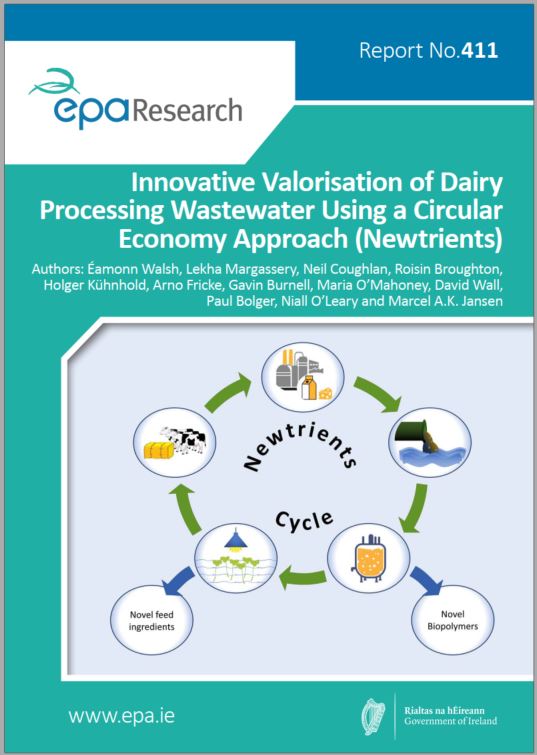Research 411: Innovative Valorisation of Dairy Processing Wastewater Using a Circular Economy Approach (Newtrients)
Authors: Éamonn Walsh, Lekha Margassery, Neil Coughlan, Roisin Broughton, Holger Kühnhold, Arno Fricke, Gavin Burnell, Maria O’Mahoney, David Wall, Paul Bolger, Niall O’Leary and Marcel A.K. Jansen
Summary: There are pressing economic and environmental concerns regarding the imbalance between resource consumption and regeneration. This research successfully demonstrated a paradigm shift in how wastewater is treated by developing a pioneering cascading system for valorisation of dairy wastewater, based on circular economy principles. It successfully developed an integrated system coupling microbial-based technologies of anaerobic digestion and aerobic dynamic feeding with duckweed cultivation.

Project Highlights
Watch the project highlights video
Identifying Pressures
There are pressing economic and environmental concerns regarding the imbalance between resource consumption and regeneration. These concerns relate to the over-exploitation of key resources, such as wood, minerals and water, and the consequences for food supply and the climate. Many valuable resources are currently lost through wasteful production processes, which generate waste streams where treatment, not recovery, is the primary focus. Sustainable production and consumption are now seen as crucial for delivering a more sustainable society. Circular economy models focus on closed-loop production patterns, long-term value retention, and reductions in the linear use of raw resources and production of waste. Waste valorisation is an area in which there are tangible opportunities for resource recovery while lowering waste remediation costs, reducing greenhouse gas emissions and instigating innovative business models. In Ireland, dairy processing wastewater represents a significant waste stream and a financial and technological challenge for the industry. The Newtrients project successfully demonstrated a paradigm shift in how wastewater is treated by developing a pioneering cascading system for valorisation of dairy wastewater, based on circular economy principles.
Informing Policy
In the past decade, the European Union has published several strategies for sustainable industrial growth based on circular economy principles. The “Europe 2020” strategy focuses on creating sustainable economic growth through resource efficiency. Furthermore, the European Commission’s report Innovating for Sustainable Growth provides a basic framework for better resource efficiency and a roadmap towards a low-carbon economy. Circular economy approaches have also been strongly advocated in the Irish Government Circular Economy Bill 2021 and as part of the United Nations Sustainable Development Goal 12 (responsible consumption and production). In response, numerous industries are in the process of developing zero-carbon, circular economy-based operational models. Yet, there is an urgent need to underpin policy-inspired initiatives with tangible, technical examples of how companies can achieve circularity. Newtrients has successfully demonstrated the potential for developing novel, practical and financially attractive solutions to pressing environmental challenges. These solutions can inspire further development of circular economy approaches within commercial, policy and public arenas.
Developing Solutions
Newtrients has successfully developed an integrated system coupling microbial-based technologies of anaerobic digestion and aerobic dynamic feeding with duckweed cultivation. Each step in this cascading system contributes a clearly identifiable, value-added output, but also delivers broader impacts for sustainable waste remediation. The overall value of the Newtrients cascading system is that it (1) is resource efficient, (2) generates value-added and marketable products, and (3) reduces dependence on finite fossil fuel resources. The stable conversion of organic carbon loads in dairy wastewaters to volatile fatty acids and other chemical building blocks constitutes an innovative, sustainable route for the production of non-petrochemical-based polymers, including bioplastics. The recycling of nitrogen and phosphorus in wastewater yields protein-rich biomass and enables a closed-loop rural feed industry. Overall, the Newtrients cascading system results in the effective remediation of dairy wastewater while generating products that can strengthen the local economy and create intricate new relationships between farmers, dairy processors and innovative rural industries.
https://www.epa.ie/media/epa-2020/research/epa-funded-research/Report-cover-411.jpg